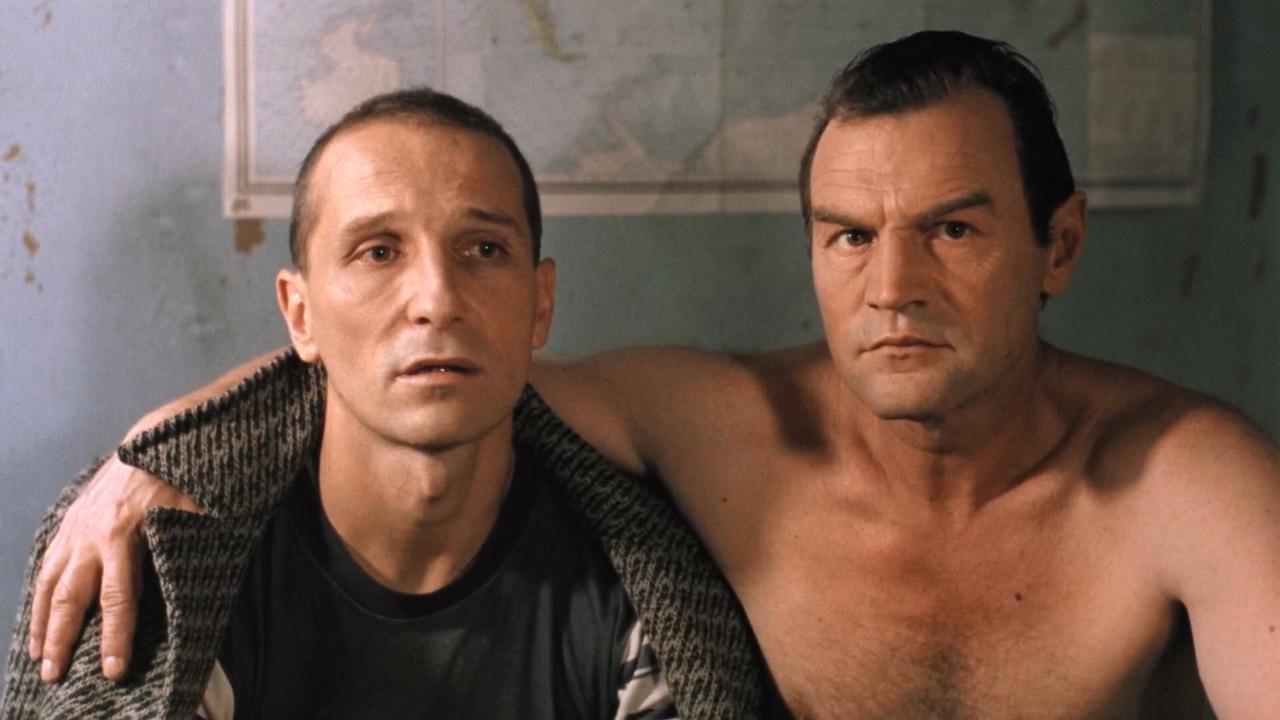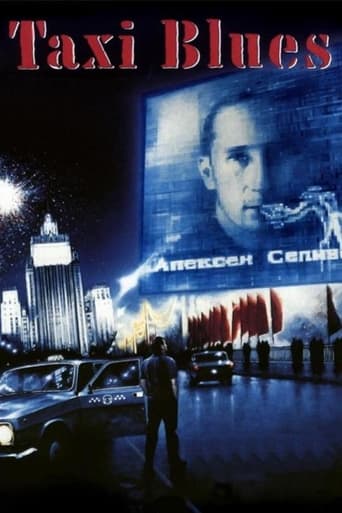Dorathen
Better Late Then Never
Patience Watson
One of those movie experiences that is so good it makes you realize you've been grading everything else on a curve.
Yash Wade
Close shines in drama with strong language, adult themes.
Sanjeev Waters
A movie that not only functions as a solid scarefest but a razor-sharp satire.
Michael Neumann
The past collides with the present in this unflinching portrait of life behind the late Iron Curtain, showing the often antagonistic relationship between a half-mad, free-spirited saxophone player and his older, old-fashioned alter ego, a hack who has seen too many changes through the window of his Moscow cab. Alexei's exuberant, non-conformist energy is the catalyst for the drama but this is clearly Ivan's film, and the story matches his often irrational mood changes while staying remarkably true to its characters, presenting both archetypes in three not altogether appealing dimensions (Ivan is a traditional anti-Semite; Alexei is an irresponsible deadbeat). The film conveys with almost naked candor the seamier side of the new Moscow subculture, adding a somewhat veiled accusation of moral corruption and decadence in the social reforms of Perestroika. The imagery is often arresting, but if the film is critical of Western influence it isn't entirely immune to them, and it's disconcerting to see the story end in a routine car chase slapped together from what look like outtakes from a William Friedkin movie.
FilmCriticLalitRao
A post Perestroika film like "Taksi-Blyuz" must be viewed in the context of Russia after 1990s.It is a landmark film in the history of Russian cinema.It speaks about an independent Russian state which might be a little difficult for some non Russian people to understand.It must be mentioned that it is not all an American Taxi Driver.The core issues of this film are masculinity,music and patriotism but still our hero grapples with numerous emotional conflicts.In today's modern day Russia,I am sure that so much has changed ever since it was created in 1990.The taxi is old in this film and decline of Russia is becoming a sore sight for natives as well as foreigners.There are many black markets where everything can be purchased.One such street vendor sells old stuff such as a saxophone,some old clothes. This is a short story of oppressed and oppressor.This film is not for you if you are expecting to watch a modern day Russia."Taksi-Blyuz" is not a film about poverty but about all factors known for making people come to terms with poverty.Pavel Lungin has made his film with a tinge of sadness.It is a nice thing that women have a minor presence as most of them lack strong will power."Taksi-Blyuz" is a true perestroika film to be admired for its inherent Russianness.
chinpeng
This film shows the conflict and forming of a friendship between two opposites: Shlykov, the hard-working patriotic cab driver built like a tank, and Lyosha, the thin, panhandling urban Jew.A taxi driver in Moscow named Shlykov gets stiffed of his fare by the Jewish saxophone player named Lyosha who calls himself a genius who "speaks to God". Shlykov tracks down Lyosha and takes his saxophone and that is when the fun begins.Lyosha fails to make money fast enough to pay Shlykov back but Shlykov decides to give him back his saxophone anyways. Lyosha, sensing Shlykov's soft heart, tries to further take advantage of him by begging him for money. After Shlykov lets Lyosha in his apartment, and after Lyosha causes him great trouble costing him even more money, Shlykov takes Lyosha to jail.After a violent outburst by Shlykov he decides to go back to the police station to drop the charges against Lyosha. He has decided that sending Lyosha to jail would accomplish nothing. He wants to show Lyosha what life is like for honest hard-working people. Shlykov makes Lyosha come to work with him. The "intellectual" breaks down when forced to do what millions of other people in the country have to do everyday of their lives. Both characters show impulsive and unpredictable behaviour, but for different reason. Lyosha is simply a drunk. Shlykov is a patriotic ex-athlete full of proletariat angst and senses his nation is dying because of the "rotten" westernized hooligans he sees everywhere in the streets who lack any work ethic.I will not reveal the ending to you but I will tell you this story is not a fairy tale.I think this film goes much deeper than just showing what life was like in the USSR; the two characters can be found in almost every culture in the world today.Excellent performances by both Zajchenko and Mamonov.
grob248
Besides this, I have only seen one movie by Pavel Lungin, namely Luna-park, which also comes off highly recommended. Taxi Blues is an excellent work all in itself. Lungin very well transcends the chaotic atmosphere in Russia during the late Perestroika period, and prior to the break-up of the Soviet Union itself. The tumultous relationship between two main characters represents bipolar parts of the Russian society, and shows degradation of the social fabric. Piotr Mamonov (who is also the leader of the well-known Moscow rock-band Zvuki Moo) turns in an impressive performance as Lyosha - a westernized, alcoholic Jewish mucisian. The rest of the characters are equally picturesqe, be it the strong willed, conservative, nationalistic taxi driver, or his neighbor, an old man of the Stalinist generation. The film's unsettling pacing and incessant moodswings further contribute to the overall picture. An excellent film from one of Russia's leading directors.

